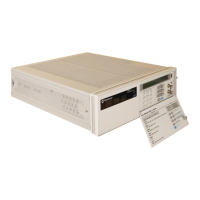Appendix B Glossary
5071A Glossary
Operating and Programming Manual 161
Short-Term Stability See Time Domain
Stability.
Standards —
• House: The most stable and accurate
frequency source available as a reference within
the user‘s facility. Usually kept referenced to
national frequency standards.
• Reference/Transfer: The reference standard
used to transfer frequency or time from the
house standard to working standards.
• Working: The standard against which
instruments are compared for test or repair
purposes.
Settability The degree to which the frequency
of the 5071A may be adjusted to correspond
with a reference without loss of stability.
Time Domain Stability (also called short-term
stability); The standard deviation of fractional
frequency fluctuations in the specified output
signal due to random noise in the cesium
standard. The mathematical method by which it
is calculated is called the Root Allan Variance.
Symbolically, it is represented by the term
y
(2,
) where
y
is the standard deviation, 2 means
that measurements are taken in pairs, and is
the measurement time.
In the 5071A specifications, values for all
averaging times are shown in one chart for
convenience. However, short-term stability
specifications for averaging times in excess of
1000 seconds are valid only under laboratory
conditions (temperature 25 ± 5 C, relative
humidity 45% ± 10%). For more information on
time domain stability, see NIST Technical Note
1337, Characterization of Clocks and Oscillators
available from the Superintendent of documents,
U.S. Government Printing Office, Washington
D.C. 20402-9325.
Time Interval Time between events.
UTC Coordinated Universal Time; An
internationally agreed-upon time scale having
the same rate as Atomic Time. UTC is
corrected in one-second step adjustments, as
needed, to remain within 0.7 seconds of
Astronomical Time
UT1 A non uniform time scale based on the
earth‘s rotation and corrected for the effects of
polar motion.

